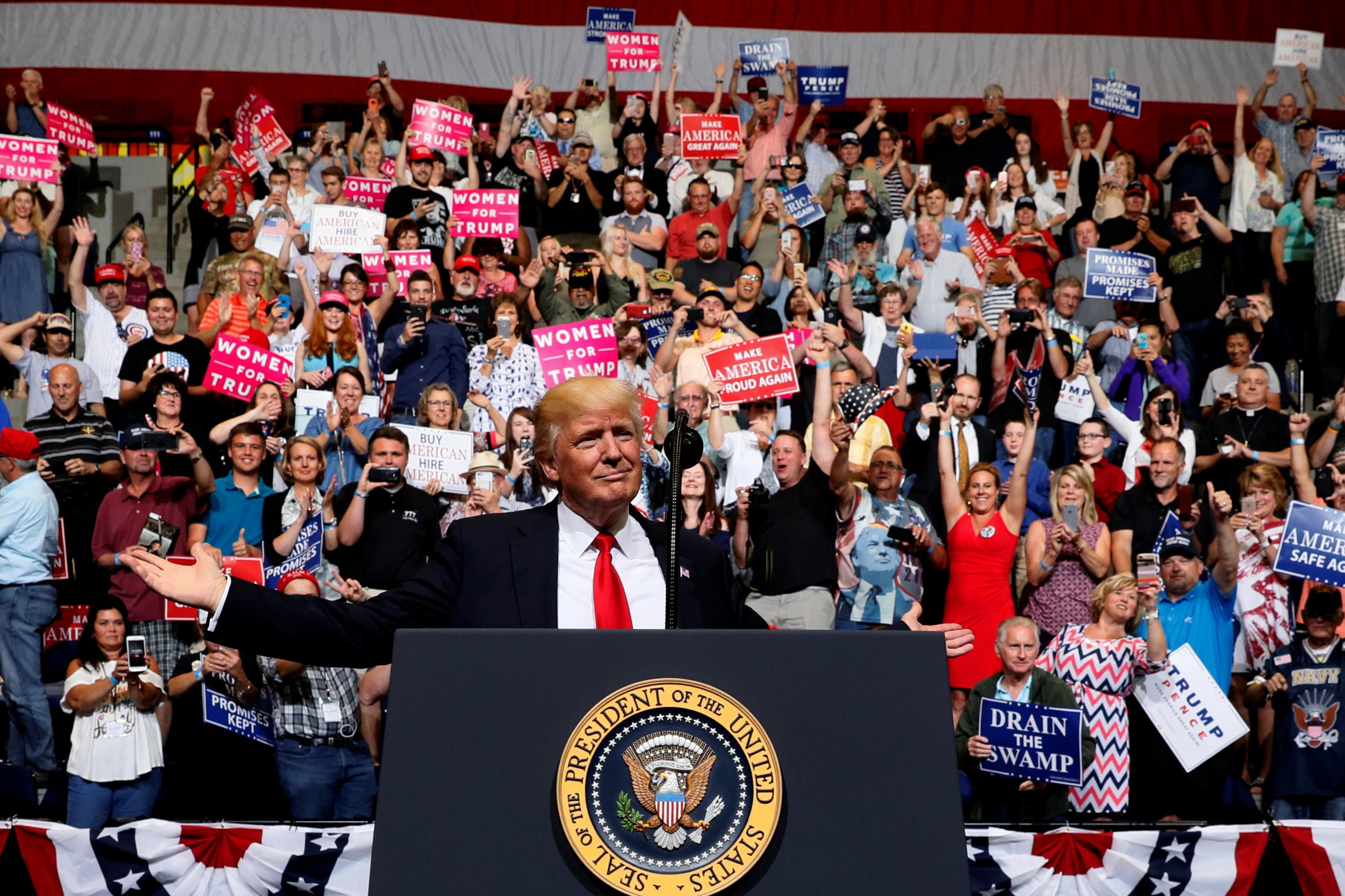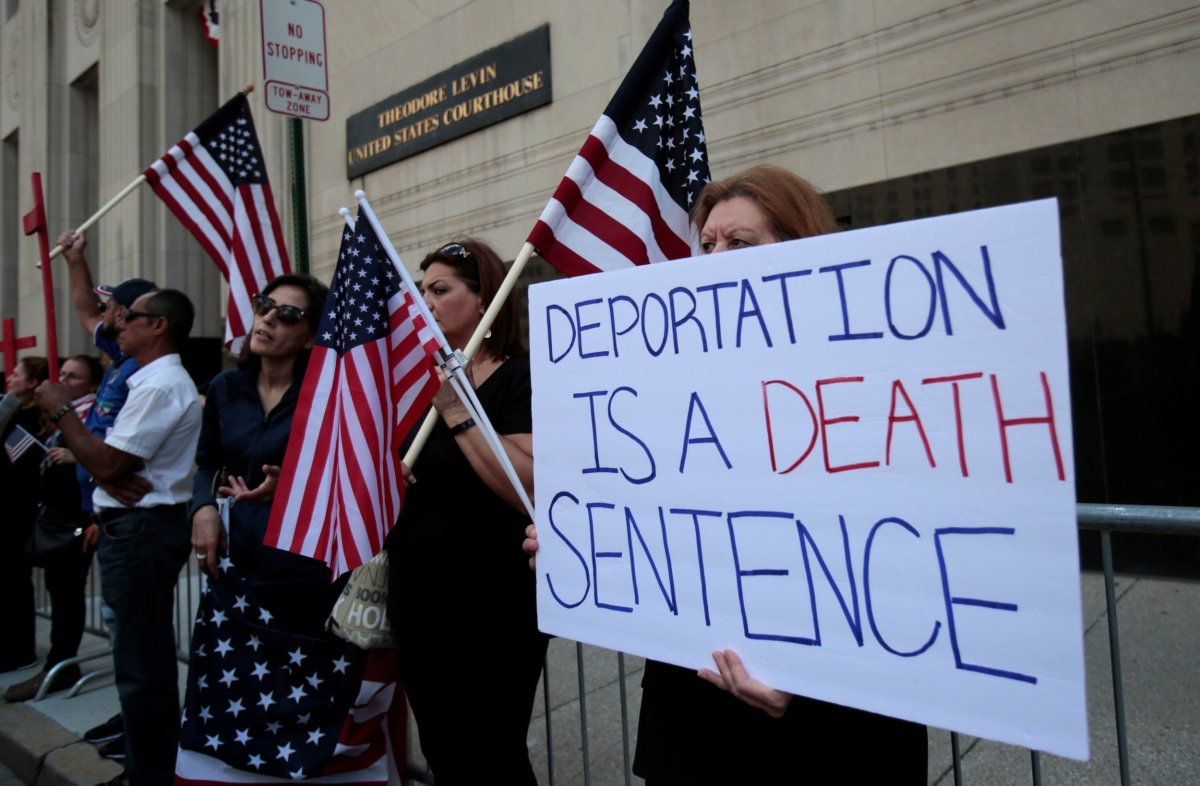
If President Trump can't build a border wall out of concrete, he will repel immigrants with his own cruelty. That was, at least, my thought as I listened to Trump's latest foray into un-American xenophobia, disguised as usual as patriotism.
"Those seeking immigration into our country must be able to support themselves financially and should not use welfare for a period of at least five years," he said during a Wednesday night rally in Iowa that had him going after his favorite straw men: the media, Democrats, immigrants, China.
He said so many outrageous things—surprise!—that the line about revoking federal assistance to new immigrants (which is already quite limited) didn't fully land until this morning.
But once it landed, it stung.
My family wouldn't be here without "welfare," an imprecise term that I take it means food and healthcare assistance in particular. There was plenty of state-sponsored cruelty to go round in the Soviet Union, which we left in the 1980s, heading first to Europe and then the United States. If that's what we could've expected in America, we would've stayed in Russia.
In fact, we were helped every step of the way, by both the American government and American citizens, from the time we prepared to leave Leningrad to about our third or fourth year in the United States, when we no longer felt "new" or "poor."
I don't remember the exact nature of the "welfare" we got because I was just a kid. But I know that we got it. Most of all, I remember the generic, almost colorless labels on government-issued food, so at odds with the vibrant labels of American supermarket goods that I had come to love, Count Chocula in particular. I know that my grandmother was on Medicaid for her entire life. I also know that there were long stretches during which my father—who had a Ph.D. in physics, but not a grasp of the English language—either delivered pizza or didn't work. If there hadn't been welfare then, I don't know how we could have made it.
RELATED: Trump's Iowa rally: President says he'll build 'solar wall'
It is a long-held Republican myth that poor people want to be on welfare. In 1976, Ronald Reagan famously evoked the welfare queen who became something of American lore: "She used 80 names, 30 addresses, 15 telephone numbers to collect food stamps, Social Security, veterans' benefits for four nonexistent deceased veteran husbands, as well as welfare. Her tax-free cash income alone has been running $150,000 a year." Were there really welfare queens? Well, there was one woman in Chicago.
Nobody wants to be on welfare—but we sometimes need it. Federal assistance is sort of like the military: We shouldn't deploy it recklessly, but we also shouldn't pretend that we can survive without it.
Trump, who was born to a millionaire father, doesn't grasp how much being on welfare makes you want to get off welfare. Federal help is humiliating, even if you desperately need the help. You want to eat Count Chocula, not government cheese.
Like every other immigrant family I have ever known, mine worked tirelessly to get off welfare, which we did in time. We've been citizens for decades. We all pay taxes, vote and contribute to civil society in other ways (by tweeting out dachshund GIFs, in my case). Before my grandmother died, she was able to vote in a U.S. presidential election, for Bill Clinton. This was a moment of immeasurable pride for her.
Ironically, it was during Clinton's presidency that benefits to immigrants were cut. His 1996 "welfare reform" act took away many of the federal benefits that helped immigrant families like ours. The National Immigration Law Center describes the effect of those oh-so-progressive Clintonian reforms:
After these laws' enactment, most lawfully residing immigrants were barred from receiving assistance under the major federal benefits programs for five years or longer. Even where eligibility for immigrants was preserved by the 1996 laws or restored by subsequent legislation, many immigrant families hesitate to enroll in critical health-care, job-training, nutrition and cash-assistance programs due to fear and confusion caused by the laws' chilling effects.
Do immigrants use welfare more than non-immigrant Americans. Yes, says a study by Steven A. Camarota of the Center for Immigration Studies, a group that advocates for less immigration: 51 percent of immigrant families (whether legal or not) use some form of federal assistance. That's 21 percentage points higher than the welfare-usage rate for non-immigrant families.

At the same time, in many states, immigrants actually earn more than native-born Americans. As Anand Giridharadas wrote in The New York Times in 2014, describing recent research, "if you are born elsewhere and later acquire American citizenship, you will, on average, earn more than us native-borns, study further, marry at higher rates and divorce at lower rates, fall out of the work force less frequently and more easily dodge poverty."
This shouldn't be surprising. Human nature is to repay generosity with generosity. Only, of course, a paranoid narcissist playing out his despotic fantasies is unlikely to grasp that obvious truth.
Forget all of Trump's lurid images of illegal immigrants pouring across the southern border, taking away blue-color jobs in the Heartland. The economic golden goose that is Silicon Valley would not be possible without immigrants, who started what are today some of the world's most revered and valuable companies.
But the nativists who love Trump loathe those immigrants too. Chief White House political strategist Stephen K. Bannon, an ultra-nationalist, once complained about the preponderance of Asians in Silicon Valley. The Washington Post unearthed a 2015 exchange between Trump and Bannon on the latter's radio program:
Trump said he was concerned that foreign students attending Ivy League schools have to return home because of U.S. immigration laws.
"We have to be careful of that, Steve. You know, we have to keep our talented people in this country," Trump said. He paused. Bannon said, "Um."
"I think you agree with that," Trump said. "Do you agree with that?"
Bannon was hesitant.
"When two-thirds or three-quarters of the CEOs in Silicon Valley are from South Asia or from Asia, I think . . . " Bannon said, not finishing the sentence. "A country is more than an economy. We're a civic society."
These people don't like Latinos, Mexicans or Asians. Anyone who does is a "globalist" or "elitist." They've tried to keep them out with travel bans and border walls, but that hasn't worked. So now they will try cruelty. I fear this may be a better tactic. Certainly, it would have kept us out of America.
Uncommon Knowledge
Newsweek is committed to challenging conventional wisdom and finding connections in the search for common ground.
Newsweek is committed to challenging conventional wisdom and finding connections in the search for common ground.
About the writer
To read how Newsweek uses AI as a newsroom tool, Click here.








